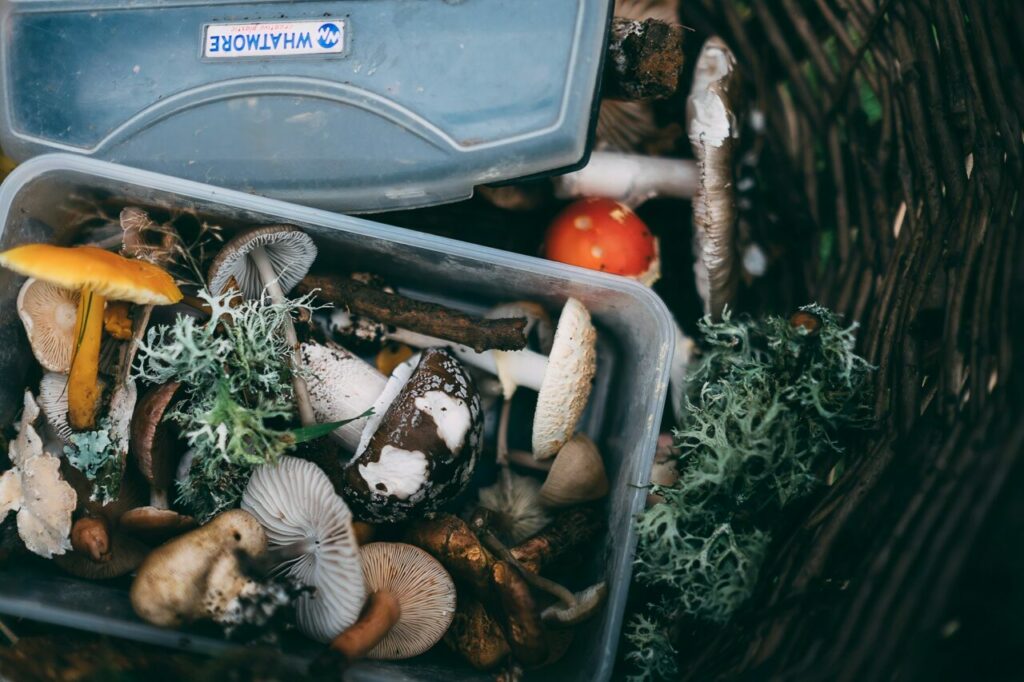Did you know that edible mushrooms might potentially boost your problem-solving skills? An intriguing study published in Gerontology & Geriatric Medicine indicates that older individuals who have taken psychedelic substances demonstrate improved executive functions and show fewer symptoms of depression compared to those who haven’t.
In addition, the consumption of psychedelics may possibly slow down cognitive decline and contribute to a healthier, extended lifespan. Let’s explore how the active ingredients in shrooms make this possible.

Key Takeaways:
- Psychedelic therapy shows promise in improving cognition and reducing anxiety. It can foster self-reliance by enhancing cognitive adaptability.
- Edibles provide a convenient, discreet means of ingestion. They offer measured doses, reducing the likelihood of excessive consumption.
- Addressing the psychological and emotional wellbeing of seniors suffering from chronic conditions is essential for maintaining their cognitive health and quality of life.
Executive Functions and Problem-Solving Skills
Executive functions are mental skills that allow us to plan, organize, and complete tasks. These abilities are essential for:
- Efficient time management
- Maintaining concentration and avoiding distractions
- Problem-solving and making decisions
- Adapting to new or unforeseen situations
In everyday life, executive functions allow us to perform simple tasks such as following a recipe, managing a budget, or resolving disagreements.
The Significance of Executive Functioning in Seniors
As we age, various health issues related to the aging process can impact our mental health and cognitive abilities. Common difficulties often include:
- Challenges with maintaining organization
- Struggling to remember steps to finish a task
- Problems adjusting to new circumstances or routines
- Slowed abilities to solve problems and make decisions
Considerable changes
It can become progressively challenging to remain self-sufficient and handle day-to-day tasks.
Medicines prescribed for these issues can lead to unwanted side effects, which is why many people are exploring alternative remedies. Psychedelic therapy is gaining attention as a potential strategy to improve cognitive functions and treat mental health conditions without suffering from adverse long-term effects.
Scientists speculate that it could spark new neural connections, thereby enhancing problem-solving capabilities. If administered correctly, it could also alleviate anxiety or rigidity, which may hamper the decision-making process.
While more research is needed, current findings suggest that psilocybin could be a valuable resource for older individuals who aim to enhance their cognitive abilities and preserve their independence.
What Does the Research Suggest?
Psychedelics like LSD, psilocybin (found in magic mushrooms), and MDMA are known for their impact on perception, mood, and cognition.
Magic mushrooms were traditionally used in rituals. Nowadays, their potential therapeutic effects on mental health conditions such as depression and PTSD are under investigation. A recent study explored the effects of psychedelics on cognitive functions in middle-aged and elderly individuals, primarily focusing on executive functioning and mental health.
Research Methodology
The researchers employed data from the MIDU study, a national survey investigating health outcomes in aging populations. Key details include:
- Participants: The study included 2,503 adults (average age 64; 55% women) from 48 states.
- Assessments:
- Executive Functioning: Evaluated through cognitive tests.
- Episodic Memory: Assessed using the Brief Test of Adult Cognition by Telephone.
- Depressive Symptoms: Measured via the 7-item DEPCON scale.
Using multiple linear regression models, factors such as age, demographics, medical conditions, and substance use were taken into account. Participants provided information about their The study also explores the correlation between the use of psychedelics and various lifestyle aspects such as job status, habits like smoking and drinking, and chronic health conditions.
Key Findings
- There is a marked improvement in executive functioning and a noticeable reduction in depression symptoms among people who use psychedelics.
- However, the use of psychedelics did not lead to enhancements in episodic memory.
- Younger people, women, and those dealing with certain lifestyle challenges such as joblessness, smoking, or health-related issues were more likely to use psychedelics.
Analytical Overview
Clinical evidence indicates that psychedelic mushrooms and edibles may positively influence executive functioning and alleviate depression symptoms. This supports their potential therapeutic use in treating mental health conditions and preserving cognitive health during aging.
While traditional antidepressants often result in side effects, especially in older adults, psychedelics present a hopeful alternative with less adverse effects. By enhancing mood and brain function, psychedelics could potentially stall the cognitive decline associated with age-related ailments such as dementia.
It is crucial to address the mental and emotional health of older adults with chronic conditions to enhance their mental health and overall quality of life.
Usage of Mushroom Edibles Among Older Adults
Shroom edibles are gaining popularity among older adults intrigued by the potential health benefits of psilocybin. Mushroom-infused chocolate bars and gummies offer a convenient, enjoyable, and controlled way to experience its effects.
The primary reasons older adults favor these edible products include:
- Mushroom gummies eliminate the need for preparation or measurement of mushrooms, making consumption easier.
- The flavored products mask the natural earthy taste of raw mushrooms. Older adults have a wide variety of edible options to select from, such as chocolate bars, gummies, baked goods, candies, and more. They can also produce or purchase mushroom-infused drinks like tea, soda, coffee, and energy drinks.
- These products are portable and can be consumed discreetly without drawing attention.
- Every product is labeled with a consistent dosage, reducing the risk of accidental overdose.
- They provide a milder way of consuming mushrooms, particularly beneficial for those with digestive complications.
*Note: These products contain Psilocybe cubensis, not the more commonly known Amanita muscaria mushroom. The Amanita muscaria mushrooms contain compounds such as muscimol, ibotenic acid, and muscarine. This research primarily focuses on psilocybin, present in Psilocybe mushroom products.
H3: Safe Dosage Guidelines
The impact of edible products can start anywhere from 30 minutes to 2 hours and last between 4-12 hours. For a pleasant mushroom experience, follow these recommendations:
- Begin with a small dose.
- Wait at least 2 hours to assess the effects. If you don’t notice any, consider a slight increase in dosage.
- Gradually adjust until you find your ideal dose. Remember, patience is key. Rushing may lead to undesirable outcomes. Consume responsibly and at a slow pace.
- Consider your tolerance level. Reactions can vary from person to person.
- Prioritize safety. Stay in a comfortable, familiar setting.
- Having a sober friend present can be helpful, especially for beginners.
- Plan your time accordingly. The effects can last for several hours, so ensure you have a clear schedule.
- Purchase from a reputable retailer or dispensary to avoid the risk of ingesting toxic mushrooms.
Benefits of Psilocybin Beyond Problem-Solving
- Mental Health Support: It can alleviate persistent feelings of sadness or anxiety, especially in individuals resistant to conventional treatments. It’s also useful in emotional processing and can help those dealing with trauma (PTSD).
- Boosts Creativity and Innovative Thinking: It aids users in approaching problems from different perspectives and fostering creative ideas. It enables users to break free from their habitual thought processes and explore new cognitive paths.
- Emotional Growth and Connection: It heightens self-awareness, enabling people to address unresolved issues and experience personal growth. It also helps in fostering emotional connections with others. class=”wp-block-heading”>How do they influence a person’s sense of self?
- Spiritual and Existential Enhancements: These substances can induce profound experiences, offering greater insight into life’s purpose and values. Users commonly report enhanced mindfulness and feeling more attuned to their surroundings.
- Neuroprotective Properties: Psychedelics can facilitate the formation of new connections which may decelerate cognitive degeneration in elderly adults. Initial clinical research indicates potential benefits in offering protection against neurodegenerative diseases like Alzheimer’s.
- Gummies and Chocolates: Effects are typically felt within 30–60 minutes due to their basic ingredients, making them a balanced option for those seeking moderate onset and convenience.
- Baked Goods: These require more digestion and metabolism, hence effects are usually felt between 60–90 minutes. They are ideal for those who prefer a slower onset.
Psychedelics can foster a deeper understanding of one’s self. A number of users have reported heightened empathy and a greater sense of connection to others after their experiences.
Wrapping Up
The ability to plan, solve problems, and adapt to changes, known as executive functions, often deteriorate with age. Psilocybin therapy emerges as a promising solution to combat this decline. Studies suggest that psychedelics could enhance cognitive abilities, mitigate depression, and promote emotional and spiritual growth. By incorporating shroom edibles into their routine, seniors might improve their cognitive functions, maintain their independence, and lead a healthier, more satisfying life.
Get Magic Mushrooms Canada is a virtual mushroom dispensary where you can procure your mushroom edibles. Simply pick your preferred products, and we’ll deliver them straight to your doorstep.
Commonly Asked Questions
What types of shroom edibles are most effective for older adults?
Can hallucinogenic substances assist in memory retention for seniors?
Traditional psychedelics can impact memory performance depending on the dose. Lower doses often won’t significantly affect memory, while higher doses can impede spatial, verbal, semantic, and episodic memory. However, experienced users may be less susceptible to these effects.
Psychedelics have the capacity to magnify the intensity of personal memories, activating the recall or re-experiencing of emotionally intense memories, both good and bad. This process may lead to the recovery of suppressed or forgotten memories.
How to safely combine psilocybin with other drugs?
Given the prevalence of regular medication usage among seniors, it is crucial to exercise caution when considering therapy involving psychedelics. The interaction between psychedelics and other drugs can lead to heightened, reduced, or unwanted effects.
If psychedelic therapy is on your mind, it’s essential to engage in a discussion with your physician about possible interactions with your current medications. They may recommend adjustments to your medication schedule or dosage to lessen any potential risks.


